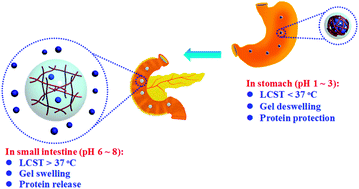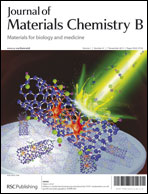pH- and thermo-responsive poly(N-isopropylacrylamide-co-acrylic acid derivative) copolymers and hydrogels with LCST dependent on pH and alkyl side groups†
Abstract
A series of pH- and temperature-responsive poly(N-isopropylacrylamide-co-acrylic acid derivative) (P(NIPAM-co-AAD)) copolymers and hydrogels were prepared. The lower critical solution temperatures (LCSTs) of the copolymers exhibited a dependence on both pH and the hydrophobicity of the AAD unit. The influence of pH and temperature on the equilibrium swelling ratio of the hydrogels was investigated. The hydrogels displayed a unique thermo-induced swelling–deswelling transition that can be self-regulated to occur at above or below the physiological temperature in response to the environmental pH. Scanning electron microscopic (SEM) analysis revealed porous sponge-like microstructures of the hydrogels. Insulin was loaded into the hydrogels as a model protein, and the in vitro release profiles indicated that the loaded protein could be protected within the hydrogels in an acidic environment and selectively released in neutral medium. MTT assay proved that both the copolymers and hydrogels are nontoxic. After oral administration of the insulin-loaded hydrogels to streptozotocin-induced diabetic rats at 60 IU per kg, the fasting plasma glucose level was reduced continuously to 72.1% within 6 h. The bioavailability of hydrogel-encapsulated insulin via the oral administration to healthy rabbits reached 5.24%, which is much higher than that of pure insulin solution given orally. These results showed that the smart copolymers and hydrogels may hold great promise for pH-triggered drug delivery systems.


 Please wait while we load your content...
Please wait while we load your content...